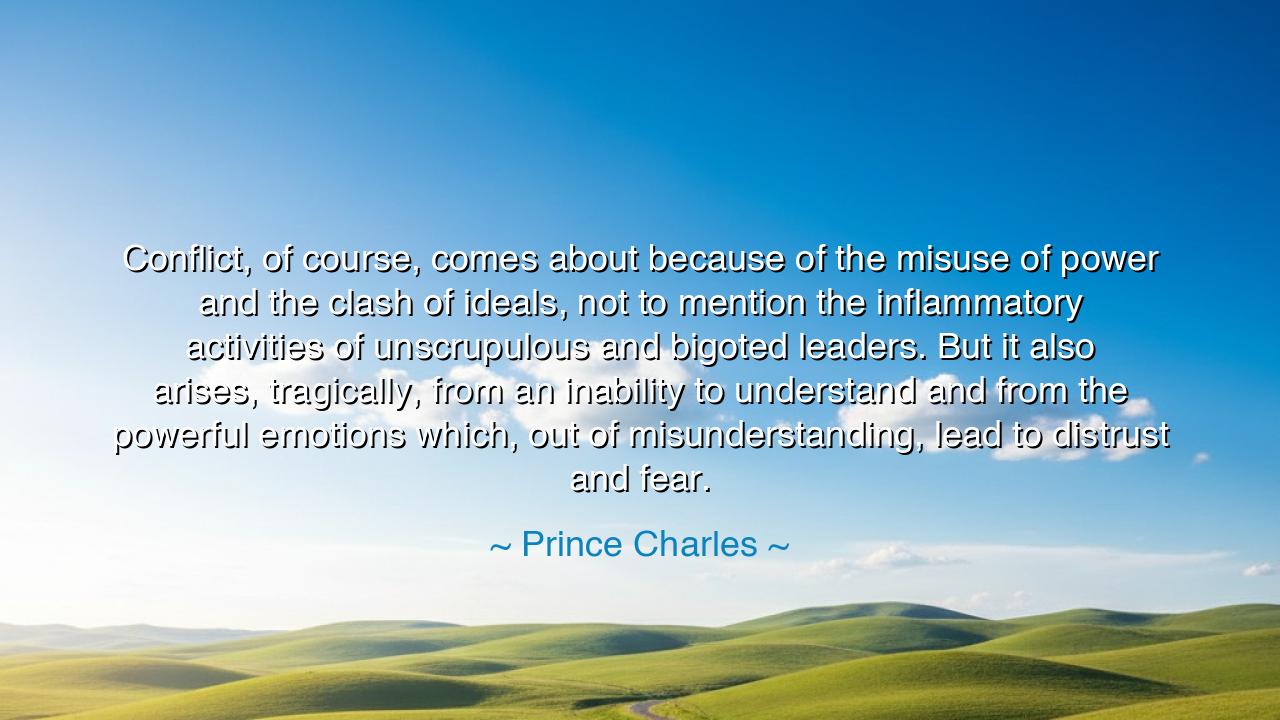
Conflict, of course, comes about because of the misuse of power
Conflict, of course, comes about because of the misuse of power and the clash of ideals, not to mention the inflammatory activities of unscrupulous and bigoted leaders. But it also arises, tragically, from an inability to understand and from the powerful emotions which, out of misunderstanding, lead to distrust and fear.






Hearken, O children of wisdom, to the solemn words of Prince Charles, who beheld the origins of conflict with the discerning eye of one who has watched the tides of history. He teaches that strife is often born from the misuse of power, from the clash of ideals, and from the inflammatory activities of leaders blinded by bigotry or self-interest. Yet he warns that beneath these apparent causes lie deeper currents: misunderstanding, distrust, and the powerful emotions that fester when hearts fail to perceive one another. Here lies the eternal counsel: the flames of discord ignite not solely through ambition, but through the shadows of ignorance and fear.
The origin of this reflection arises from the years in which Prince Charles, heir to the British crown, observed the tremors of a world fractured by war, prejudice, and political ambition. Amidst the unrest of the late twentieth and early twenty-first centuries, he perceived that rulers and nations alike often acted without empathy, without striving to comprehend the hearts and cultures of others. His insight comes from a life straddling privilege and responsibility, where the observation of human misunderstanding and its consequences became a guide to cautious and compassionate leadership.
The meaning of his words extends beyond politics into the hearts of all mortals. Conflict is rarely born of necessity alone; it is often nurtured by misperception and fear, by emotions untempered by reason or dialogue. When men fail to seek understanding, when they allow distrust to fester, the smallest spark can ignite the greatest conflagration. In this, Prince Charles reminds us that the path to peace lies not merely in restraining power or negotiating ideals, but in cultivating empathy, clarity, and moral courage in every interaction.
History bears witness to this eternal truth. Consider the tragic tale of Yugoslavia in the 1990s, where centuries of interwoven cultures and beliefs were rent asunder. Leaders, driven by ambition and prejudice, fanned the flames of ethnic mistrust, while centuries of misunderstanding amplified fear and suspicion. The resulting conflicts were not merely political—they were profoundly human, arising from the inability of people to truly know and respect one another. Here, Prince Charles’ words echo: the roots of tragedy lie in both the misuse of power and the blindness of hearts.
Yet let this teaching not sow despair, but illuminate the path to reconciliation. To recognize the sources of conflict is to arm oneself with wisdom: to temper power with justice, to measure ideals with reason, and to soothe the flames of fear with understanding. Every act of empathy, every effort to listen, every gesture of genuine respect, becomes a shield against the tragedies wrought by misunderstanding and mistrust.
O generations yet to come, carry these words as a lantern in the shadowed corridors of human affairs. For the wise perceive that conflict is neither random nor inevitable—it is the offspring of folly, ignorance, and unchecked emotion. And thus, by seeking understanding, by tempering the heart with reason, and by guiding power with virtue, humanity may turn the tide of discord into a legacy of peace and harmony.






HHUY
I find this perspective insightful because it blends structural and emotional causes of conflict. It makes me consider whether our current political and social frameworks adequately address the interplay between misuse of power and human misunderstanding. Could global institutions or local governance do more to mediate tensions arising from fear and distrust? I also wonder whether cultivating empathy and critical thinking at a societal level could serve as a preventative measure against both deliberate and accidental conflicts.
LLDieu Linh Le
Reading this, I feel reflective about the human tendency to let emotions override reason. It implies that even when leaders act ethically, misunderstandings among people can still spark conflict. How can communities create systems for dialogue and emotional regulation that reduce the chances of fear and distrust turning into violence? It also raises the question of accountability: to what extent should individuals and leaders be responsible for managing these dynamics?
GHNGO VU GIA HAN
This quote provokes a proactive question: if much conflict arises from miscommunication and fear, what role should education and diplomacy play in addressing it? I’m curious whether early intervention in understanding diverse perspectives could prevent escalation, and how leaders can responsibly manage their own rhetoric to avoid inflaming tensions. Does this suggest that conflict prevention is as much about cultivating empathy as it is about balancing power?
MCMinh Chau
I feel a sense of both frustration and hope reading this. While it highlights how bigotry and manipulation by leaders can incite conflict, it also emphasizes that human emotions and misunderstanding are central causes. This makes me question how much responsibility lies with individual citizens versus those in power. Can cultural awareness and emotional intelligence programs help mitigate these conflicts, or are some disputes inevitably fueled by deeper systemic and ideological divides?
TANguyen Tuan Anh
This statement makes me reflect on how conflict is rarely caused by a single factor. It suggests that both deliberate misuse of power and unintended misunderstandings contribute to discord. I wonder whether education, empathy training, or conflict resolution strategies can reduce these misunderstandings and emotional triggers. How can societies foster deeper understanding to prevent fear and distrust from escalating into more serious clashes, even when leaders may act unscrupulously?